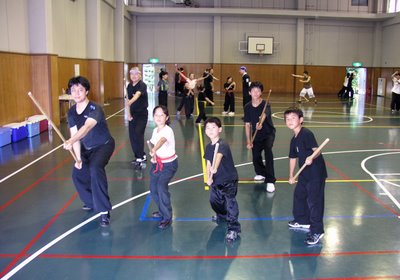Newly elected Prime Minister Shinzo Abe named his Cabinet on Tuesday, giving most of the posts to his close aides and the people who actively supported him during the Liberal Democratic Party presidential election.
The 52-year-old president of the ruling LDP is the youngest postwar prime minister and the first to be born after World War II.
Yasuhisa Shiozaki, Abe's longtime ally and a specialist in economic policy, was appointed chief Cabinet secretary. He will also handle issues pertaining to North Korea's past abductions of Japanese.
"I believe that (the Cabinet picks) have contributed with individuality in various fields," Shiozaki told reporters after announcing the rest of the Cabinet appointments.
Taro Aso, Abe's rival in the LDP presidential race, was reappointed foreign minister, where he will continue efforts to mend ties with China and South Korea.
The repeated visits by Abe's predecessor, Junichiro Koizumi, to Yasukuni Shrine have chilled Japan's relations with the two Asian neighbors and they refused to hold summits with him.
Under Aso, diplomats have been working behind the scenes to arrange summits between Abe and the leaders of the two nations.
After his reappointment, Aso told reporters Japan has strengthened its presence in the international community during his first term as foreign minister.
"Diplomacy is one of the methods to minimize the crisis" over North Korea's July 5 missile tests, Aso said. I "believe that Japan was able to connect with other countries and that led to taking swift measures against the North Korean" tests.
Aso also said Japan-China relations are at their best in areas other than politics. Bilateral cultural exchanges and the number of people moving between the two countries are at all-time highs, he said.
Japan has always welcomed a meeting with China, Aso said, noting Beijing is setting the conditions for this to occur.
The finance portfolio went to Koji Omi, former minister in charge of issues related to Okinawa and the Russian-held islands off Hokkaido.
Fumio Kyuma, chairman of the LDP Executive Council under Koizumi, was appointed Defense Agency director general. Kyuma also held the top defense job under Prime Minister Ryutaro Hashimoto.
From the private sector, Hiroko Ota, an economics professor at the National Graduate Research Institute for Policy Studies, was named economics and fiscal policy minister.
Earlier in the day, Abe was elected prime minister with the majority vote held by the LDP and its coalition partner, New Komeito, in the House of Representatives. Abe secured 339 votes of the 476 cast in the Lower House, compared with 115 votes for Ichiro Ozawa, president of the Democratic Party of Japan. In the House of Councilors, Abe received 136 of the 240 votes cast, while Ozawa got 85.
The new minister of economy, trade and industry, Akira Amari, and minister of health, labor and welfare, Hakuo Yanagisawa, headed Abe's LDP presidential campaign.
New faces include Yuji Yamamoto, former senior vice finance minister, who was given the financial services portfolio, and Yoshihide Suga, who was named minister of internal affairs and communications.
Both Yamamoto and Suga publicly supported Abe's run for LDP leader early on and headed a group of about 100 junior LDP lawmakers to promote Abe's "second chance" campaign to help people who have failed in business.
When reporters asked if Abe's presidential campaign supporters had pressed him for Cabinet positions, Yamamoto called that an outrageous notion and said ministerial positions should not be given out as rewards.
"I believe (supporting someone to become leader) is a different issue and that the appropriate personnel should be chosen for the Cabinet," Yamamoto said.
At the request of New Komeito, Tetsuzo Fuyushiba, the party's departing secretary general, joined the Cabinet as minister of land, infrastructure and transport.
To strengthen his political power, Abe picked Junzo Matoba, a former bureaucrat who has been in the private sector for nearly 10 years, as deputy chief Cabinet secretary. Traditionally, the three deputy chief Cabinet secretaries, who are liaisons between the ministries and the prime minister's office, have included one current bureaucrat and two politicians.
Abe also increased the number of special advisers to the prime minister to five from two. Issues they will deal with include national security, Pyongyang's abductions, economic and fiscal policy, education reform and public relations.
See related links:
Cabinet lineupHawkishness is watchword for Abe teamNew lineup a good indicator where policy emphasis will beSouth Korea urges Abe to develop future-oriented relationsTanigaki to Abe: Maintain commitment to fiscal reformAlso, stories of a Formal PM, Junichiro Koizumi:
Koizumi's Shake, Rattle & RollJapan hasn't seen his like before, but what did the populist PM really achieve?
Source: The Japan Times











